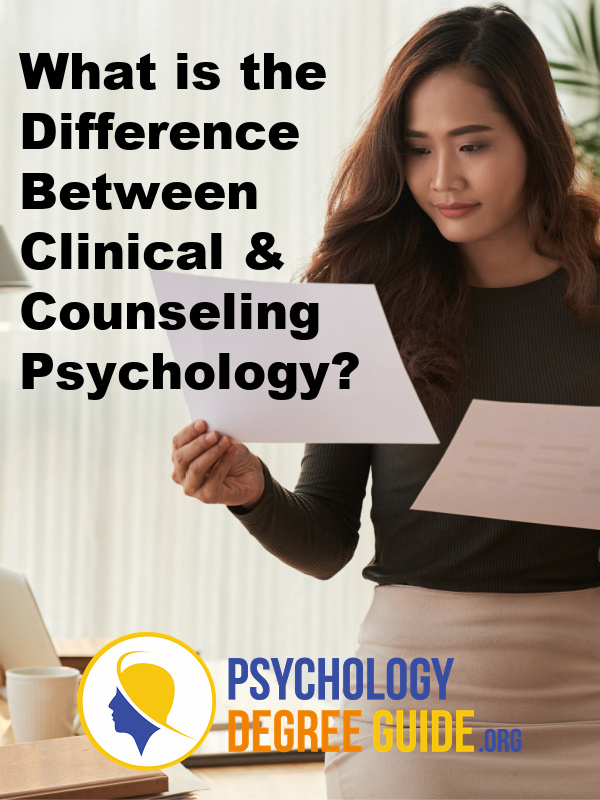What is the Difference Between Clinical and Counseling Psychology?
- February 1, 2021
- Posted by: Administrator
- Category: Resource Guides, Student Resources,

Psychology is a fascinating field covering many varying areas of study including everything from educational to forensic psychology. However, there are a few specialties with quite a bit of similarity and overlap which can make it confusing when deciding to narrow your focus.
Two very popular psychology degrees are clinical and counseling psychology. These two degrees share many common points so students are sometimes confused about which one is the right one for them to specialize in.
Here we will break down each of these specialties and look at:
- What are the pedagogical approaches for each degree?
- What are the education requirements for each degree?
- Where are you most likely to work after graduation?
- What are the licensure requirements?
Clinical Psychology
Clinical psychology is a specialty focused on understanding, evaluating and treating mental, emotional and behavioral processes. Clinical psychologists are trained in the diagnosis, intervention, treatment and prevention of mental and emotional disorders. The sub-fields of clinical psychology can be grouped as (1) assessment, (2) treatment, and (3) research.
Clinical psychologists apply psychological assessments to evaluate an individual’s capabilities or to diagnose a specific mental health disorder. In treatment, clinical psychologists use psychotherapy approaches and may specialize in a specific approach. Also, research is a critical part of clinical psychology.
In the 1950’s it was demonstrated that psychotherapy was as effective as drugs in the treatment of psychological disorders and by later that decade clinical psychologists were able to legally diagnose “mental disorders” that could be used in a court of law. In 1966, the Society of Clinical Psychology was established by the APA.
It is necessary to have a license to practice clinical psychology in every state in the US. In some states, psychologists with a master’s degree can work under the supervision of a licensed psychologists. However, only psychologists with a doctoral degree are permitted to have full authority licensure.
There are two options for earning a doctoral degree in clinical psychology: PhD and PsyD. The scientist-practitioner model (PhD) focuses on research, while the practitioner-scholar model (PsyD) focuses on clinical application. Clinical psychologists investigate the mental, emotional and behavioral processes of individuals and use the results of their studies in clinical practice. Also, they use their experiences in clinical practice as references for future academic studies.
Clinical psychologists can work in academic settings, clinics, hospitals, prisons, public health centers, private practice, military, schools and universities, and many others.
These questions can help narrow your search to the graduate program best suited to your needs.
Counseling Psychology
Counseling Psychology is a specialty focused on promoting and helping individuals and groups to improve their personal and interpersonal functioning. Counseling psychologists work with clients of all age and they may focus on behavioral/emotional problems in children and families, education, work and career issues, geriatric concerns, or improving productivity and personnel performance in organizations.
Counseling psychologists are trained at the doctoral level (PhD, PsyD, or EdD) in programs including courses and training in the core areas of psychology, specialized courses related to counseling, supervision, and usually a one-year full-time predoctoral internship. Counseling psychology programs are often a part of a college’s departments of psychology, but may also be found in education departments. Most counseling psychology programs are accredited by the APA.
Counseling psychologists can work in hospitals, universities, organizations, counseling centers, universities, private practice, and many others.
The Differences Between the Two Specialties
- Counseling psychologists focus on life stresses and issues with which people may struggle in daily life, home or workplaces. Clinical psychologists focus on severe issues that can be diagnosed as psychological disorders, and the roots of disorders.
- Counseling psychologists specialize in supporting and counseling people to solve their life issues. Clinical psychologists specialize in the diagnosis and treatment of psychological disorders by using psychological techniques and therapy approaches.
- Counseling psychologists are more likely to work with healthy individuals or groups. Clinical psychologists are more likely to work with specialized groups and individuals diagnosed with a psychopathology.
- Counseling psychologists are more likely to work in university or school counseling centers. Clinical psychologists are more likely to work in hospitals or clinics.
- According to a study (Bechtoldt et al. 2000), clinical psychologists prefer to use psychoanalytical and behavioral-cognitive therapy approaches, while counseling psychologists prefer client-centered and humanistic approaches.
- The GPA and acceptance rates of students are similar in both degrees, but students accepted to clinical psychology doctoral programs had significantly higher GRE scores (Norcross et al., 1998).
The Similarities Between the Two Specialties
- Both clinical and counseling psychologists are trained to provide counseling and psychotherapy.
- Both clinical and counseling psychologists receive their licensure as “licensed psychologists” in all states, so both clinical and counseling psychologists are able to practice independently.
- The APA doesn’t distinguish between clinical and counseling psychology internships. There is one list of accredited internships for both programs.
- Once the doctoral degree is earned, both clinical and counseling psychologists can work as researchers, practitioners, lecturers, or a combination of the three (American Psychological Association Research Office, 2003).
Which One is Right for You?
It depends on your interests! If you are interested in studying psychopathology and assessment and working with people with psychological disorders, then you would probably prefer to study clinical psychology. However, if you are interested in working with healthier populations to provide emotional and vocational support, then counseling psychology can be the right choice for you.
References
American Psychological Association Research Office. (2003). Degree subfield by primary full-time employment setting: 2003 psychology doctorate recipients. Retrieved from http://research.apa.org/ des03_t4.pdf
APA (2008). Clinical Psychology. Retrieved from https://www.apa.org/ed/grad
APA (2008). Counseling Psychology. Retrieved from https://www.apa.org/ed/graduate/specialize/counseling
Bechtoldt, H., Wyckoff, L. A., Pokrywa, M. L., Campbell, L. F., & Norcross, J. C. (2000, March).
Theoretical orientations and employment settings of clinical and counseling psychologists: A comparative study. Poster presented at the 71st annual convention of the Eastern Psychological Association, Baltimore, MD.
Britannica, T. Editors of Encyclopaedia (2011, December 6). Clinical psychology. Encyclopedia Britannica. https://www.britannica.com/science/clinical-psychology
Norcross, J. C. (2000). Clinical versus counseling psychology: What’s the diff. Eye on Psi Chi, 5(1), 20-22.
Norcross, J. C., Sayette, M. A., Mayne, T. J., Karg, R. S., & Turkson, M. A. (1998). Selecting a doctoral program in professional psychology: Some comparisons among PhD counseling, PhD clinical, and PsyD clinical psychology programs. Professional Psychology: Research and Practice, 29, 609–614. doi:10.1037/0735-7028.29.6.609
Society of Counseling Psychology. Counseling Psychology Training. Retrieved from https://www.div17.org/index.php?option=com_content&view=article&id=409:counseling-psychology-vs-clinical-psychology2&catid=20
Society of Counseling Psychology. Counseling Psychology vs. Clinical Psychology. Retrieved from https://www.div17.org/index.php?option=com_content&view=article&id=409:counseling-psychology-vs-clinical-psychology2&catid=20

